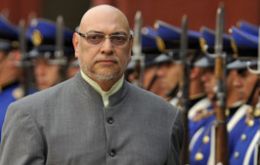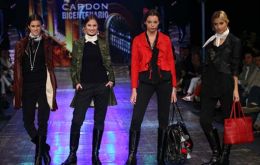MercoPress. South Atlantic News Agency
Stories for July 15th 2011
-
Friday, July 15th 2011 - 16:33 UTC
US June consumer prices fell 0.2%, but growing fears of core inflation

The cost of living in the United States fell in June, as a sharp drop in energy cost offset other price rises. Consumer prices fell 0.2%, their first monthly fall in a year; excluding energy and food, prices rose slightly. The annual inflation rate was 3.6%.
-
Friday, July 15th 2011 - 16:31 UTC
Plan to support Brazilian industry from foreign protectionism to be announced August 2

Brazil’s president Dilma Rousseff announced Thursday night the launching of a new plan aimed to boost and protect Brazilian industry against international competition and at the same called for a technological development leap forward.
-
Friday, July 15th 2011 - 13:36 UTC
Charges against 18 executives and British auditor in major Chilean retail scandal

The Chilean Securities and Insurance Supervisor (SVS) announced on Wednesday that it would be pressing charges against more than a dozen executives at Chilean retail giant La Polar.
-
Friday, July 15th 2011 - 06:35 UTC
Paraguayan congress blocks re-election attempt of an ambitious bishop-president

Paraguay's opposition-controlled Congress rejected a constitutional reform that would have let President Fernando Lugo run for re-election. The reform drive, led by Lugo's supporters, proved controversial in a country where many people have painful memories of General Alfredo Stroessner's 35-year dictatorship.
-
Friday, July 15th 2011 - 06:31 UTC
Chavez to receive cancer treatment in Sao Paulo, say Brazilian government sources

Venezuelan President Hugo Chavez will travel to Brazil for cancer treatment, a Brazilian government source told reporters, following his return home after an operation in Cuba.
-
Friday, July 15th 2011 - 06:25 UTC
Argentina denies restrictions in trade with Brazil; admits ‘logical differences’

Argentina’s trade relation with Brazil does not have restrictions and “it’s understandable that some differences surface” when bilateral trade will be reaching over 40 billion dollars this year, said Argentine Industry Ministry sources in Buenos Aires.
-
Friday, July 15th 2011 - 06:21 UTC
Argentines would like to buy at “official” inflation and be paid in real inflation

According to Argentina’s statistics office Indec consumer inflation was 0.7% pushed mostly by the cost of clothing. However private economic consulting offices estimate the index was double the official announcement.
-
Friday, July 15th 2011 - 06:18 UTC
March for education reform in Santiago de Chile turns violent with 62 arrests

A haze of tear gas floated through the air, blending in with Santiago’s smog as the Chilean flag atop La Moneda sat in solitude with an occasional breeze. Lemon halves littered the streets as flying glass bottles shattered on the concrete.
-
Friday, July 15th 2011 - 06:13 UTC
Argentine central bank purchases 500m dollars to stop appreciation of the Peso

The Argentine Central bank has purchased so far this week 500 million US dollars to ensure that the country’s exporters retain a favourable exchange rate and importers are not that tempted to buy foreign goods.
-
Friday, July 15th 2011 - 06:09 UTC
“Grain prices are more linked to the US dollar than to food demand”

“Saving in US dollars or in soybeans is the same” cautioned Argentine economist Carlos Melconian, who argued that “grain and oilseed prices are more linked to the value of the dollar than to demand for food produce”.
